Samuel Cary (1785-1815) Biography:
Cary (whose father was a minister) graduated from Harvard in 1804, when nineteen. He entered the study of theology and in 1808 he took a probationary position at King’s Chapel in Boston (which began as an Anglican Church in 1686). Successfully performing his assigned duties, in 1809 he was asked to join the staff of King’s Chapel as a Junior Pastor, but in 1815, he became very ill and was forced to retire from preaching. At the urging of friends, Cary traveled to England as a better climate in which to convalesce, but passed away while there.
The Ancient and Honorable Artillery Company was originally organized and chartered in England in 1527. Many of those who arrived in America in Plymouth in the early 1600s had been involved with the Company and saw the need for one in the New World, for there was absolutely no organized military force to provide protection. In 1637, a group of settlers sought a charter from then governor John Winthrop, but he initially refused the request, wanting no organized military that could overthrow the civil power. However, one year later, he changed his mind and granted a charter. On the first Monday of that June, the election of the officers was to take place on the Boston Commons, and for the next 300 years, the Ancient and Honorable Artillery Company conducted its annual election of officers at the Boston Commons. Across the years as traditional military and militia reduced the need for the Ancient Artillery Company, it became more of a civic organization, raising funds for local churches, helping enforce local laws, and promoting the local Boston economy. Members of the Company likewise contributed their time and finances to education, religion, and charity.
SERMON
Preached Before The
ANCIENT AND HONORABLE
ARTILLERY COMPANY,
In Boston, June 6, 1814
Being the 177th Anniversary of Their
Election of Officers
By Samuel Cary,
One of the Ministers of the Chapel, Boston,
Non jam ad culmina rerum
Injustos erevisse queror; tolluntur in altum
Ut lapsu graviore ruant. Claudian.
BOSTON:
Published by Thomas Wells, 3, Hanover Street
John Eliott, Printer.
1814.
SERMON
2 Samuel 24:16.
And the Lord said unto the Angel that destroyed the people, it is enough, stay thou Thine Hand
It is at all times a most animating subject to consider the proofs of divine agency in the affairs of this world; the connexion which exists between the revolutions of human society, its improvement or corruption, its prosperity or wretchedness and God the beneficent cause and controller of all things. It is peculiarly so at this period of the world, when we have lived to see a course of events, to which nothing in history can be at all parallel; events so vast, so unexpected, so appalling; which have so baffled all our calculations and all human foresight, that the mind cannot rest upon mere natural causes, but ascends and fixes itself upon that invisible power, which calls order out of confusion and joy out of depression and despair. And the subject presents itself with obvious propriety on the present occasion, when the soldier appears in the temple of the most high, to acknowledge, that his courage and strength and skill, without the divine blessing, are all vanity; that it is God, who covers him with his shield in battle; that peace and war, glory and shame, victory and defeat are from his hand.
I shall make no apology therefore, if I should deviate from what may have been the usual practice on these occasions, for the sake of making such remarks upon these great occurrences, as may display the agency of divine providence in producing them and their tendency to confer ultimate and great benefit upon human society.
Let us endeavor to recall some of those apprehensions, which not many months ago, made every good and every thoughtful man among us tremble for himself and for mankind. What a spectacle of horror, of cold-hearted, merciless tyranny, of the irresistible and triumphant career of vice was at that time exhibited in Europe! We saw a despotism of a character totally unknown in modern history, more ferocious and more extensive than the soundest politicians had believed could have existed in an advanced and enlightened state of society, establishing itself, upon the ruin of old and venerable habits, principles and institutions;-a despotism possessing all the worst features of the ancient governments, with more experience, more profound views of human nature, more skill in applying itself to the character, the favorite prejudices, the corrupt passions and sympathies of mankind;-a dreadful despotism, which held both soul and body in chains. We saw it advancing with an impetuosity, which confounded all calculations and all resistance; bearing down in its course, monarchs and armies and nation, degrading the exalted, disarming the powerful, endeavoring to crush every feeling of patriotism and every manly sentiment; proclaiming an exterminating war against human liberty, virtue and happiness. We saw it inflicting misery upon its victims till their courage is gone, till they resigned themselves to despair.
It was a time of universal dismay—a day of clouds and of thick darkness. There was nothing in prospect to support or encourage hope, no visible means of arresting the destroyer in his course and saving the world from slavery, nothing in short to console the philanthropist but confidence in the over-ruling, the ever watchful, the benevolent providence of the Supreme Being. The most enlightened of our citizens thought they could perceive distinctly, that the foundations of this terrible power were laid with too much care and were too broad and deep to be shaken by any probable human efforts; that there were causes, to be found in the profligate spirit and principles of the French revolution and in the habits and comparative imbecility of the other nations of Europe, which ensured its permanence and its security. They told us of the immense resources of France; of the admirable subtlety with which her plans of subjugation had been conceived and the steadiness with which they had been kept in view and the success which had followed them; of the boldness with which she had released herself from every mortal obligation, from all those common ties, those habits and laws, which connected her with other people and place her in some measure within their control. A nation like France, despising the restraints of justice and humanity, calling its whole population to arms, employing its whole wealth in the service of war or of corruption, giving all its spirits and energies to foreign conquest, must, as they thought, be always irresistible. They told us of the martial enthusiasm of this people, of their thirst for glory and their contempt for the arts of peace, a passion which had marked their national character for centuries, which was diffused through all ranks and all possible conditions, which glowed in the bosom of squalid penury and reconciled the slave to his chains and was extinguished only with life;– a passion which taught them to submit to any sacrifices and to follow any leader who could cut his way to victory. We were referred to the character of the man, who held these great resources at his own disposal; to his fierce, inexorable, insatiable ambition; to his unrivalled skill in the art of sowing discord among his enemies, dividing their strength, alarming their fears, inflaming their cupidity; to the originality and grandeur of his military schemes, the facility with which he could strike all the points of his object at the same moment, the fury of his onset, the rapidity with which one blow was followed by another, the immense armies, trained by exact discipline and animated by the hope of victory and plunder, with which he could overwhelm his terrified enemies. We were told of that keen sight, which penetrated all the sources of danger and was forever on its guard, which detected hostility in its very germ and could blast it; which suffered nothing to escape its notice, however remote, however difficult of access, which could serve as an instrument of ambition. Can we forget the impassioned tone of eloquence, in which our statesmen and orators declared to their countrymen, that the same fatal influence, which had destroyed the energies of Europe, had extended itself to our own shores and was already visible in the base servility of the government and in the degraded character and growing depravity of the people? Can we forget the anguish, which these great men saw their country associating itself with the fortunes of this sanguinary tyrant and throwing at his feet the noble inheritance, which had been purchased with the blood of its best citizen? We thought of consequences of this most hateful union. It was a theme, on which our emotions were unutterable; on which we dwelt, “till our hearts grew liquid and we could have poured them out like water.”[i]
Let me hold this picture before your eyes a little longer. — It was a time, when men said, one to another, doth God know this? Is the arm of the Lord shortened, that he cannot save? Why is this moral desolation, this contempt of truth and justice and mercy and good faith, permitted to spread itself over the face of society? It was indeed the language of short-sighted impatience, of unmanly, thoughtless despondency; of men, who, because they could not see the end of these things and how far this confusion and misery might be consistent with the ultimate felicity of mankind, distrusted the benevolent intentions of the Deity; of men, who did not allow themselves to consider, that the design of the calamity, might be corrective and remedial; that, however terrible and mysterious, it might still be intended to to remove greater and more fatal corruptions and to be the instrument of some vast and permanent good to be conferred hereafter. We have proofs equally strong and incontestable, that the storms of society and the storms of nature are called forth and controlled by God. We see them equally serving as means of purification and followed by that genial, benign sunshine, which yields health, plenty and cheerfulness. Everyone knows, that war, not-withstanding its influence upon public morals and its innumerable calamities, is one of the most powerful instruments, in the hand of God, of destroying deep rooted and inveterate abuses, of elevating the human character, eliciting its noblest energies and displaying all the sublimity of virtue; that it advances society toward perfection, increases its knowledge, improves its condition, excites its piety;[ii] that its ultimate effects, in one word, are often inestimable. While the dark cloud is hanging over our heads and the thunder is roaring furiously around is, the heart may perhaps sink with terror, because the end is distant and uncertain and the tempest, we think, may discharge its fury upon ourselves. But if we are permitted to live til it is over and the light of heaven gain bursts forth in full splendor, we feel that what excited all this solicitude was a dispensation of mercy.
We have seen the justice of the Supreme Being manifested in the utter ruin of this tremendous despotism. It is now proved to have been a scourge in his hands, inflicting misery under his eye and in such degree and to such extent, as his perfect wisdom determined to be right. It was permitted to rise, like a malignant star, to a fearful elevation and to “shake pestilence from its horrid hair,” till the mysterious purpose of heaven was accomplished; and then God stretched forth his hand and sunk it forever. There is nothing since the miraculous victories of the Old Testament. Which has demonstrated the divine interposition so clearly, as this great act of retribution; nothing which has taken place so directly in opposition to the strongest human probabilities, or to which human causes, even in the eye of the most intelligent observers, appeared so totally inadequate. Could we have believed, that a force so immense and irresistible as that which invaded the north of Europe, a body of disciplined warriors, a mass, vigorous, active, intelligent, in proportion to its magnitude; animated by the most powerful of human passions; supported by the accumulated resources of Europe, conducted by a leader, accustomed to see victory hovering about his standard, whose very name paralyzed the strength of his antagonists; and opposed by a people without political or military renown and degraded by domestic tyranny ,—that these vast armies were marching to their graves? Could any human sagacity have foreseen, that, in the heart of a half civilized country, there would have been displayed a miracle of magnanimity, unequalled by anything ever exhibited among mankind and will be learnt by future ages of admiration,—a people sacrificing their capital, the object of deep religious awe and the strongest national enthusiasm, to the safety of their country? Could we have thought, that this accursed enemy of virtue herself?— that his overthrow would be so sudden, so complete, so awful; that this mighty conqueror, who had set God and man at defiance, should, in the space of a few months, have fled, a trembling coward, alone, exhausted seeking his safety within the walls of his own palace; that so many enslaved people would have shaken off the yoke which crushed them to the earth and actually decree the repose of Europe, from the very throne of the disgraced and fallen oppressor? Yet this is what our eyes have seen! Oh God, how just and how terrible are thy judgments!
And now the day of vengeance and desolation is over. God has to the destroying angel, it is enough, stay thine own hand. The fearful images, which have passed before us in rapid succession, have disappeared, and the light of hope and peace is drawing upon the world. But still it may be asked, can events, which have produced in their progress such extreme misery, be referred to the Supreme Being, and to beneficence? Are we to consider the anarchy and horrors of the French revolution and its deadly enmity to religion and the consequent subversion of the most sacred rights of mankind, as produced by the permission of God and as an act of mercy? Let it be remembered, my friends, that evil, or what we call evil, when it is employed as the punishment of vice, or as the means of rectifying disorder, or of producing good, is one of the instruments of benevolence. If it is the only mode, or the most effectual mode of promoting human improvement;—if, for instance, it is the direct the direct tendency of this great experiment, which we have now seen brought to its conclusion, to develop and to establish those principles, which are essential to social happiness; if it will serve to give mankind more enlightened views of the nature of government or of religion, to increase their knowledge or their virtue, to effect radical and permanent beneficial changes in their condition;— then it is unquestionably a subject of thankfulness to heaven and ought to be acknowledged as such by us, who survive the storm and by those, who come after us. That this is, in fact, its tendency, I will endeavor to show in a few words.
It would be wrong for us to undertake to say what precise effects will take place when this convulsion of Europe has subsided. But there are some general views of the subject, which, at least, so far display its tendency to promote human happiness upon the whole, as to vindicate the equity of the divine government in permitting it to exist.
In the first place, we may consider it as a lesson of most solemn instruction to the present and all future ages. It has taught mankind in a tone of energy, which must forever be heard and felt;— that the restraints of law and of religion are essential to the very existence of human liberty;—that a state of rational freedom is not that in which every citizen may act as he is prompted by his corrupt passions, or his false principles, or the impulse of his wild imagination; but that in which he has the power of acting the part for which God created him and improving his own character and advancing his own and his neighbor’s felicity. It has given more solid ideas of government itself and of the rights of mankind. It has exhibited to the world the singular spectacle of a pure theoretic democracy, –a government of the very populace, a state in which all ranks, conditions, and understandings are levelled, in which power is entrusted without discrimination to the ignorant and the intelligent, the upright and the base, the men of character, principle, virtue and those who have no consciousness of their responsibility and are capable of sacrificing everything to their own selfishness,—a state in which the passions are triumphant and every clamorous demagogue becomes an oracle. We have seen how far such a state of things is consistent with public liberty and happiness. We have seen the passion for unrestrained freedom overturning principles, which had been sanctioned by the experience of ages, plunging a flourishing people into anarchy, and at length subjecting it to the rod of a ferocious tyranny, which had no heart to pity the miseries it inflicted. And is it possible for us, or for posterity to see these things in vain?
It is most important, that this decisive experiment should be permitted to take place in the present state of society. It was the error of many intelligent minds, that the intellectual condition of mankind was so evidently improved, that they would now be safe under a government of philosophy; that liberty was in no danger of being abused, because men were capable of discerning their real interests and the necessity of restraining themselves. Similar experiments in ancient times had no weight in the minds of these reasoners. They saw nothing in the lesson of history, nothing in the state of the Greek and Roman republics, or the causes of their destruction, which was at all applicable to an enlightened age. They considered the principles of government as so much better understood and the means of judging rightly on subjects that immediately affect human happiness, as diffused so generally among all classes, that the seeds of corruption would be at once detected and extinguished; that a free people would, of course, be virtuous, because virtue was essential to their security. But now this delusion is ended.
In the second place, it is the evident tendency of these events to destroy the accumulated abuses of the old systems. That such abuse did exist and were inveterate and most oppressive is undeniable; that they were an effectual bar to the general advancement of society and that it was most important, that they should be rectified, is also undeniable. But how was this desirable end to be accomplished? How were evils, which had become so venerable by age, so confirmed by education and habit, so closely associated with all the sympathies of human nature, to be separated from the good and thrown away forever? Not by the mere influence of reason, for reason had to be content with power, with ambition, with avarice, with the fear of change,—with enemies, who would either despise its gentle remonstrances, or would not hear them;—not by the moral improvement of mankind, for it was first necessary to remove the evils, before such improvement could exist. Nothing could have so effectually and so radically extirpated these abuses, as the great convulsion which God, in his wisdom, has permitted to take place in Europe; an event it is true, which seemed, instead of correcting, to destroy; which overturned the whole political fabric, with its good as well as its evil, its beauty and deformity; but which, without question, will prove most salutary in its consequences. The discordant and inflammable principles, which had been so long collecting, have discharged their fury and are harmless. Society will be restored to tranquility and to refinement. It will be settled upon more solid principles awakened as it is, and made wise by the severe lessons of experience. There will probably be a more equal distribution of power, a more sacred regard to the acknowledged rights of mankind, more distinct ideas of the duties of those who govern and those who obey, a more solemn conviction, that the true glory of the one consists in giving efficacy to just laws by their ready acquiescence, and that of the other in promoting the public prosperity.
Again it is the tendency of these events to encourage a commercial, instead of a military spirit, among the nations of Europe. War has always been their passion and pride; a passion kept alive and cherished by the nature of their governments, their habits and institutions. But in the general wreck of ancient habits and institutions, these sources of military enthusiasm have disappeared and will not soon and perhaps never be revived. War is at length a prostrate and vanquished enemy. The world is exhausted by its miseries and tired of the follies of ambition and the blood-stained trophies of victory. What a lesson for the pride of kings in the poor, degraded exile of the Mediterranean, yesterday the terror and scourge of mankind, darting thunder from Olympus and covering the earth with desolation; today so low, so despicable, that his conquerors will not deign to crush him!
Europe will now seek felicity in the arts of peace, in the interchange of good offices, of wealth, of knowledge; in the encouragement of industry and honorable enterprise, in giving useful employment to all classes of its population; in exciting a love of order and truth and justice and all those virtues, which are the support and ornament of society. That commerce may eventually produce luxury and its peculiar vices and a spirit of mutual hostility, is not improbable. But in the mean time the general state of society will have been most essentially improved; habits of amity will have been formed between the people of different nations, the principles of national law and justice will have become generally understood and respected; and war will neither possess its present malignant character, nor will its effects be so ruinous to the general interests of mankind.
I persuade myself, that these most awful dispensations of divine providence are intended to produce great efforts upon the religious character of society. They have already drawn the eyes of the world to the Supreme Being. In the stillness of prosperity, when men are wafted gently along the stream of life by favorable breezes and cheered by a serene sky, they forget the Creator and their dependence and their duty. It is amid the horrors of the storm and the earthquake and the falling empires that we fly to religious principles for consolation and feel that without the protective care of the Deity, we must perish, we are nothing. The persons, who are now to act a distinguished part in Europe, have been trained in the school of adversity; they know the value of religion and they will support and diffuse it by their example.
But this is not all. Christianity was given by God to soften the hearts and reform the manners of the world. It is a system most admirably adapted to its end; and eighteen centuries have elapsed since its influence began to be exerted. Has it been successful? No. and the reason is, that Christianity, as it has been current in Europe during this long period, is as distinct from that simple and benevolent religion, which was once delivered to the saints, as the abominations of Paganism. The thing, which has assumed this name, is a ferocious system, armed with the sword of the civil magistrate, loaded with disgusting absurdities, teaching sentiments concerning God and the condition of mankind, which fill the soul with horror and breathing vengeance against all, who venture to question its infallibility.
When the religion of Jesus was taken under the protection of the state as incapable of protecting itself and was decorated with artificial ornaments to make it venerable in the eyes of the vulgar; and when the scriptures were withdrawn from the public eye, as if this gift of God was an inconsiderate gift and ill adapted to the conditions or wants of man,— then a dark cloud spread itself over this bright orb, and it became invisible. Then the dogmas of ignorant pride and the reveries of an absurd philosophy were delivered to mankind, as the genuine doctrine of the gospel. Our faith fell into the hands of theorists, who undertook to make the work of omniscience more perfect, to supply what they chose to consider deficient and to beautify what to their tasteless vision seemed gross deformities. The consequence was that a mass of falsehood became incorporated with Christianity, which was handed down from generation to generation; and which, though in some measure exploded at the reformation, still exerted a most fatal influence throughout Europe. But in this whirlwind which we have seen subverting religion and liberty and government, from their foundations, these abuses, of which we speak, have disengaged themselves from Christianity. There is at least this advantage resulting under the care of divine providence from a general inattention to religion, that what is false belonging to it loses its hold upon the affections; error ceases to be encouraged and it expires; systems are permitted with impunity to be severely scrutinized; and the true principles of religion, which are indestructible, invulnerable by any revolutions of society, founded in the nature of man and eternal as his duration— these true principles rise from their temporary depression in a purified and most glorious form, to be the consolation, the support, the joy of mankind.
It appears that the great principle of Protestantism, the right of worshipping God unmolested, according to the dictates of conscience, is to be guaranteed by the new constitution of France. My friends, have we considered this all-important, this most animating fact with sufficient attention? The rights of conscience are at length distinctly recognized and protected upon the continent of Europe! Christians then are permitted to search the records of their faith, without opposition and without fear; to hold their own conclusions and to avow them honestly; to assail and reject error without exposing themselves to public scorn, or the lash of ecclesiastical tyranny. The mind is at last free. Man may worship the God of his affections and his understanding, the God of the scriptures, the God and Father of our Lord Jesus Christ, instead of the idol of superstition, or of the civil magistrate. The principle obstruction to freedom of inquiry and the acquisition of evangelical truth and the genuine influence of Christianity, are at an end and is it too much to predict, that the gospel in its original simplicity, the gospel as it was preached by Christ and his apostles, that gospel, which breathes nothing but benevolence and subdues the whole heart to purity,—will come forth from obscurity and reign in triumph over the very people who have loaded it with injuries? What a glorious prospect presents itself to our eyes! What a day is breaking upon the moral state of man! Intolerance, bigotry, persecution, —demons, your hour is come, your empire is destroyed!
Gentlemen of the Ancient and Honourable Artillery—-In applying this subject to the state and prospects of our own country, it is impossible to disguise or to restrain our apprehensions. We have seen the Supreme Being wise and benevolent in his dispensations; and this should teach us to confide in his care and to be satisfied, that whatever lot is reserved for us will be right. But at the same time we have seen him leading mankind to happiness through scenes of inconceivable misery. Perhaps it may be necessary, that we should suffer more and severely, before we are permitted to see days of prosperity. It may be that there are prevailing vices among us, which must be removed by punishment; a national tameness and insensibility to honour, which requires to be stimulated; a timid, luxurious, indolent, mercenary spirit, which fears to be disturbed, more than it fears disgrace; a national degeneracy, which must be checked before it drags us to ruin. Our fathers scorned to stop and calculate, whether it was more profitable to be freemen or slaves.—perhaps the blessing of regenerated Europe are not to be imparted to us, who may be unworthy to enjoy them. When, however, I consider the character of the nation, with which we at war, the astonishing elevation on which it stands, its unexampled magnanimity;— when I consider the heroism and inflexible fidelity with which it has defended the cause of God and man, of religion, of liberty, of justice, of everything valuable, which escaped the fangs of anarchy; the enthusiasm with which it has flown to the succor of nations who dared to struggle for their rights; its devotion to the arts of peace and to whatever improved the intellectual and moral conditions of society—-I think there is everything to hope. I think this people will not tarnish the ineffable glory which surrounds them, by an act of mere vengeance.
But, gentlemen, there are more serious causes of apprehension than foreign hostility. The collisions between this country and Europe may be extinguished. But will peace reconcile the innumerable contending interests which exist among ourselves? Will it appease the fierce animosities which are cherished by the different sections of this republic, or restrain the ungovernable spirit of party, or teach the people and their rulers to become disinterested patriots? I fear the time is not far distant, when these seeds of national disgrace and wretchedness will shoot into fatal luxuriance. But on this topic I have no time and no desire to enlarge. Let us trust in God. If prosperity is in store for us, let us take warning by what we have suffered and bear it with moderation. If we are to pass through scenes of horror, let it be with that fortitude and that dignity, which will prove us worthy of our ancestors and bright examples to our posterity.
OFFICERS OF THE COMPANY.
1813-1814
Captain, Capt. Jonathan Whitney
Lieutenant, Mr. Jacob Hall
Ensign, Mr. Caswell Beal
Sergeants,
Capt. John Roulstone Mr. Edward Gray
Mr. Abraham Wood Mr. James Hooper
1814-1815
Captain, Mr. William Howe
Lieutenant, Capt. George Welles
Ensign, Mr. Levi Melcher
Sergeants,
Capt. Benjamin Loring Capt. James B Marston
Mr. John Dodd Mr. Thomas Wells

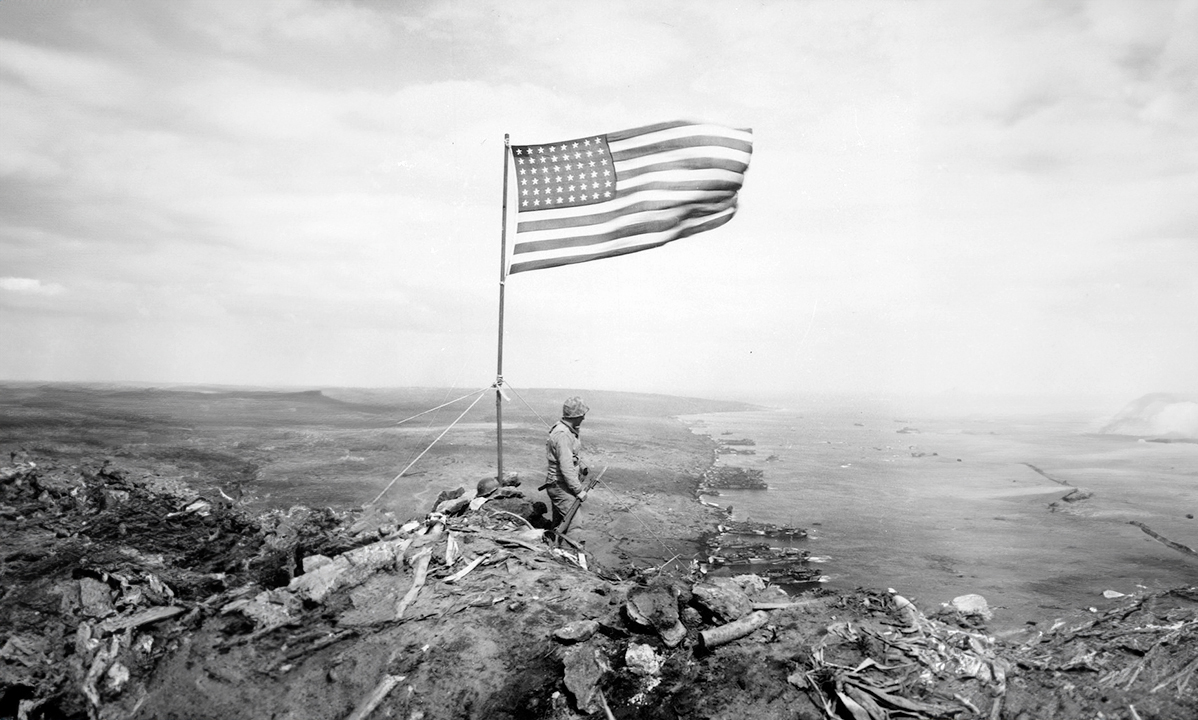
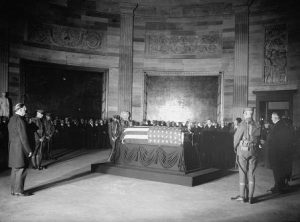 This holiday (originally known as Armistice Day) was established to remember the 1918 signing of the Armistice Treaty and to honor the heroes of World War I.
This holiday (originally known as Armistice Day) was established to remember the 1918 signing of the Armistice Treaty and to honor the heroes of World War I. 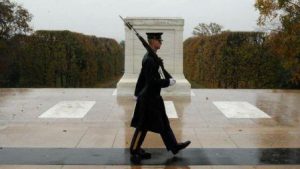 On the morning of November 11th, this soldier was given a military procession to Arlington National Cemetery and buried at what is known today as the
On the morning of November 11th, this soldier was given a military procession to Arlington National Cemetery and buried at what is known today as the  are willing to sacrifice their lives for our freedom should be celebrated and venerated.
are willing to sacrifice their lives for our freedom should be celebrated and venerated.

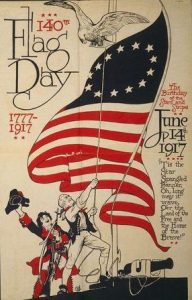 June 14th is Flag Day which commemorates the day in 1777 when the Continental Congress passed a resolution “that the flag of the thirteen United States be thirteen stripes, alternate red and white; that the union be thirteen stars, white in a blue field, representing a new constellation.”
June 14th is Flag Day which commemorates the day in 1777 when the Continental Congress passed a resolution “that the flag of the thirteen United States be thirteen stripes, alternate red and white; that the union be thirteen stars, white in a blue field, representing a new constellation.”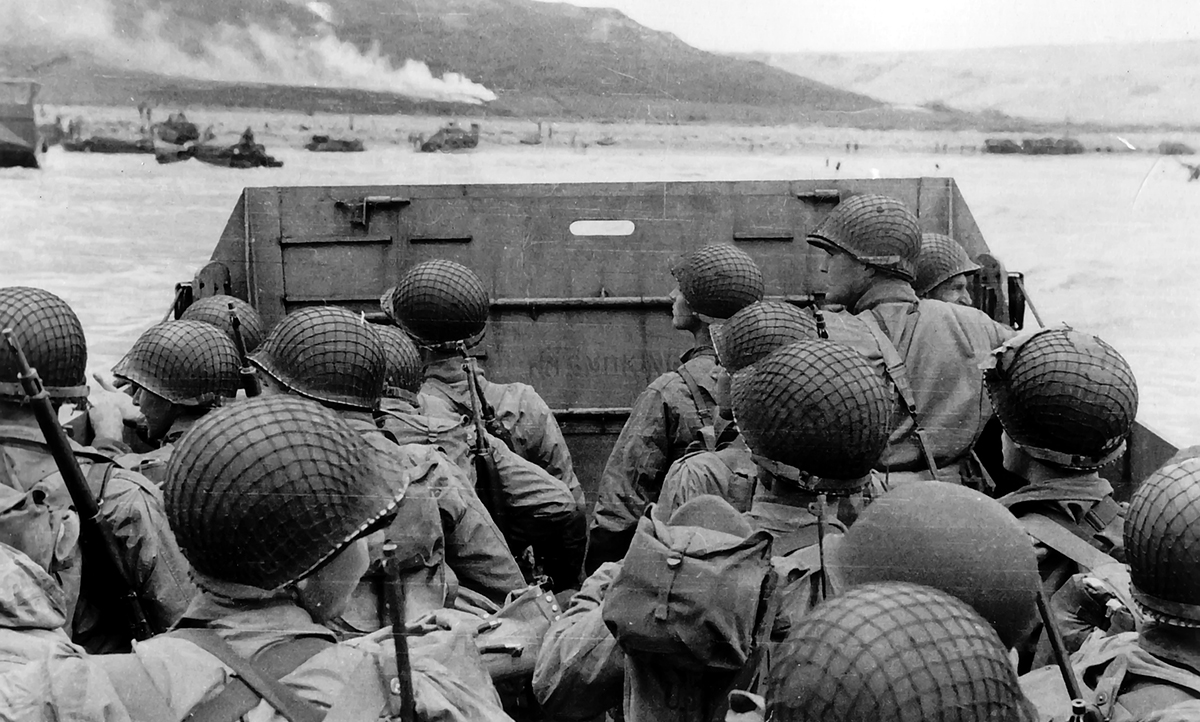
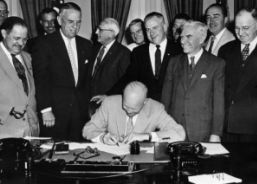 But in 1954, following both WWII and the Korean War, President Eisenhower signed an act renaming the holiday Veterans Day
But in 1954, following both WWII and the Korean War, President Eisenhower signed an act renaming the holiday Veterans Day 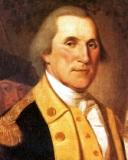 But veterans were respected and honored long before any official holiday was established, including by George Washington in his June 8, 1783
But veterans were respected and honored long before any official holiday was established, including by George Washington in his June 8, 1783  On this special day when we pause to reflect on the sacrifices made across the years by men and women willing to lay down their lives to protect and defend our Constitution, our freedoms, and our way of life, let’s be proactive in our gratitude. Thank a veteran or active military member in uniform, attend a Veterans Day parade, pray for the military families, and remind those around you of the
On this special day when we pause to reflect on the sacrifices made across the years by men and women willing to lay down their lives to protect and defend our Constitution, our freedoms, and our way of life, let’s be proactive in our gratitude. Thank a veteran or active military member in uniform, attend a Veterans Day parade, pray for the military families, and remind those around you of the 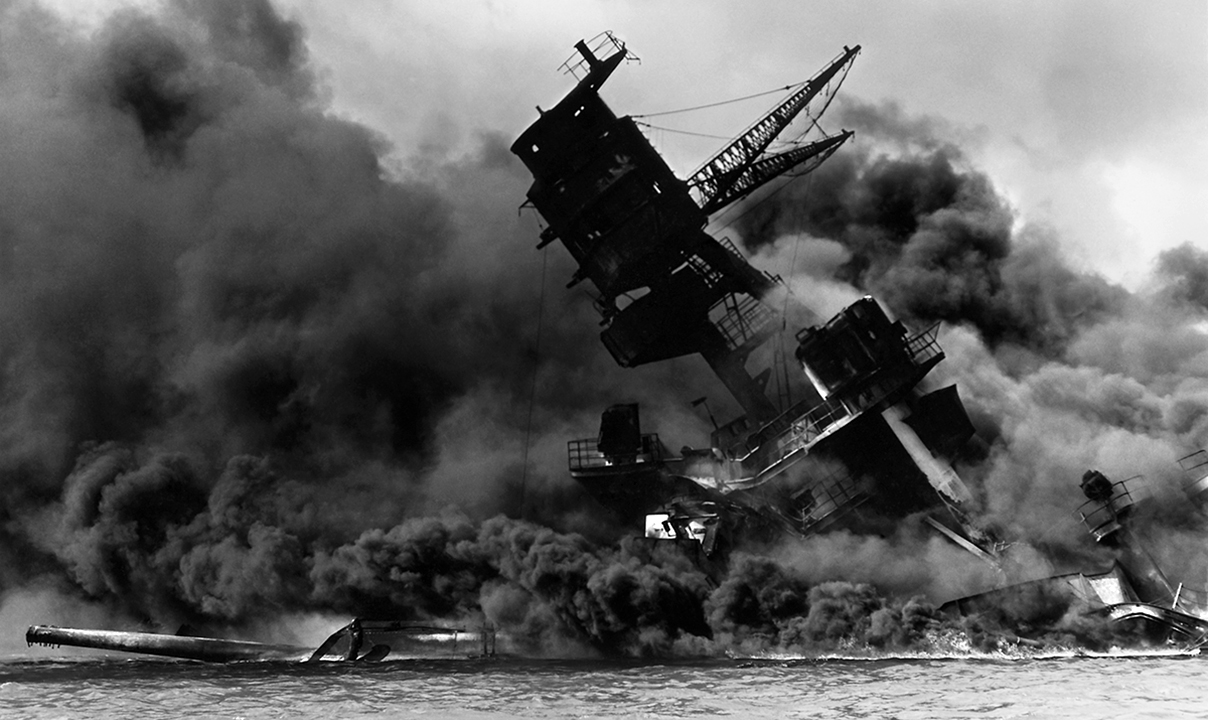




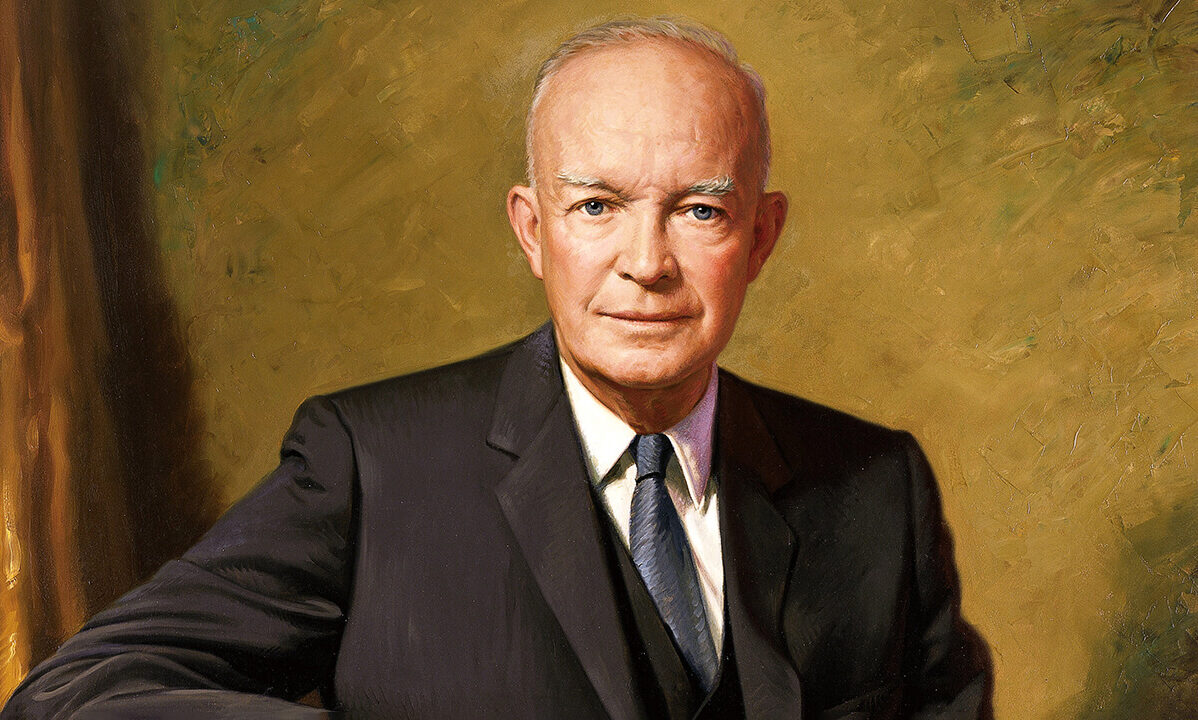
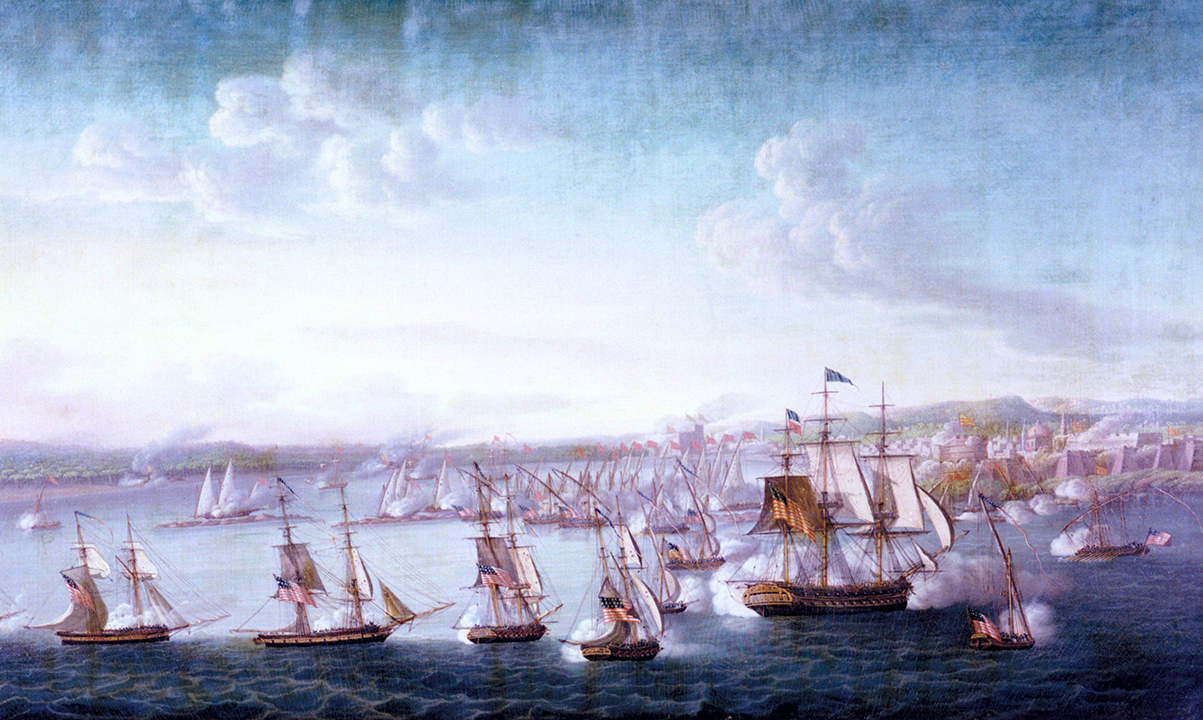
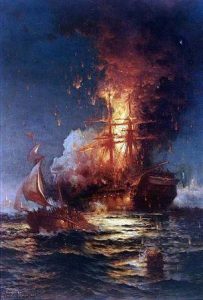 The Barbary Powers Wars were the first wars officially declared against America following our victory in the War for Independence.
The Barbary Powers Wars were the first wars officially declared against America following our victory in the War for Independence. 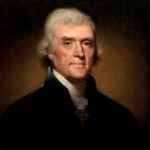 There is here an order of priests called the Mathurins, the object of whose institutions is the begging of alms for the redemption of captives. About eighteen months ago, they redeemed three hundred, which cost them about fifteen hundred livres [$1,500] apiece. They have agents residing in the Barbary States, who are constantly employed in searching and contracting for the captives of their nation, and they redeem at a lower price than any other people can.
There is here an order of priests called the Mathurins, the object of whose institutions is the begging of alms for the redemption of captives. About eighteen months ago, they redeemed three hundred, which cost them about fifteen hundred livres [$1,500] apiece. They have agents residing in the Barbary States, who are constantly employed in searching and contracting for the captives of their nation, and they redeem at a lower price than any other people can. 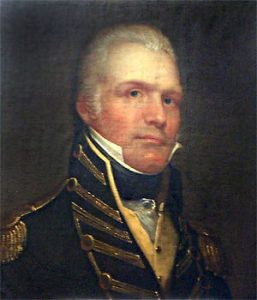 When Thomas Jefferson became president in 1801, he decided that it was time to take military action to end the two-decades-old unprovoked Muslim terrorist attacks against Americans.
When Thomas Jefferson became president in 1801, he decided that it was time to take military action to end the two-decades-old unprovoked Muslim terrorist attacks against Americans. 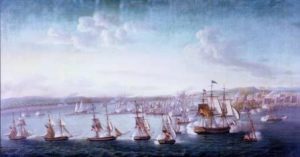 Shortly after President James Madison took office, he became engulfed in the War of 1812. With America preoccupied in a second war against the British, Algerian Muslim terrorists again began attacking Americans. But upon concluding the war with the British, President James Madison dispatched the American military and warships against three Muslim nations: Algiers, Tunis, and Tripoli.
Shortly after President James Madison took office, he became engulfed in the War of 1812. With America preoccupied in a second war against the British, Algerian Muslim terrorists again began attacking Americans. But upon concluding the war with the British, President James Madison dispatched the American military and warships against three Muslim nations: Algiers, Tunis, and Tripoli. 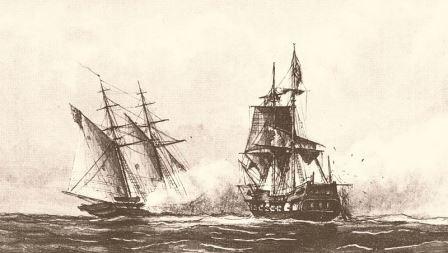
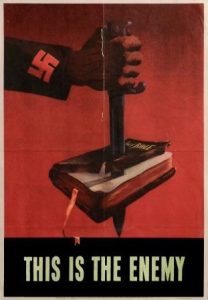
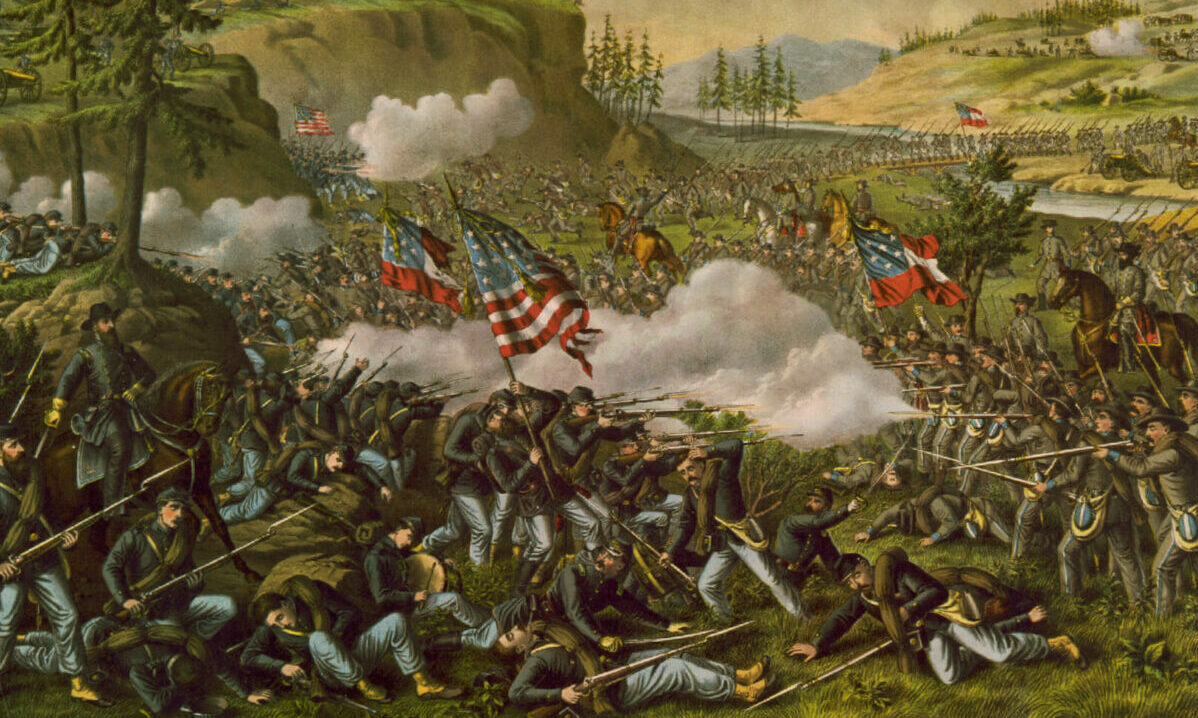
 An anniversary occurs each April of an 1861 event: the formation of the Twelfth Massachusetts Regiment. Benjamin F. Cook, who enlisted as a Union private in the Civil War and quickly rose through the ranks, was later tasked by his comrades with documenting the history of that regiment.
An anniversary occurs each April of an 1861 event: the formation of the Twelfth Massachusetts Regiment. Benjamin F. Cook, who enlisted as a Union private in the Civil War and quickly rose through the ranks, was later tasked by his comrades with documenting the history of that regiment.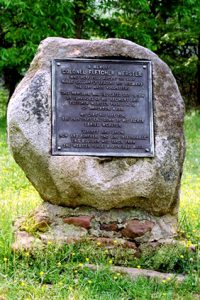 Webster concluded that speech by stating:
Webster concluded that speech by stating:
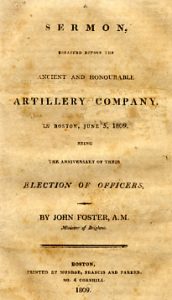 John Foster, a New England clergyman, was born in Massachusetts,on April 19, 1763. He graduated from Dartmouth in 1783 and went on to receive advanced degrees from both Dartmouth College and Harvard University. Foster was selected as the first pastor of the Congregational church in Brighton, Massachusetts, in 1783. He preached in Brighton until October of 1827, and died two years later in September of 1829. Foster was a board member of Harvard University in addition to being involved in numerous other benevolent works. He was married to Hannah Webster, who was a famous early American novelist. Here, Foster delivers what is called an “Artillery Sermon” – an annual sermon given before a military audience. Rev. Foster provides a Biblical perspective on war by discussing just war and self-defense, the lamentability of war, the importance of preparedness, and God’s sovereignty ruling over every event.
John Foster, a New England clergyman, was born in Massachusetts,on April 19, 1763. He graduated from Dartmouth in 1783 and went on to receive advanced degrees from both Dartmouth College and Harvard University. Foster was selected as the first pastor of the Congregational church in Brighton, Massachusetts, in 1783. He preached in Brighton until October of 1827, and died two years later in September of 1829. Foster was a board member of Harvard University in addition to being involved in numerous other benevolent works. He was married to Hannah Webster, who was a famous early American novelist. Here, Foster delivers what is called an “Artillery Sermon” – an annual sermon given before a military audience. Rev. Foster provides a Biblical perspective on war by discussing just war and self-defense, the lamentability of war, the importance of preparedness, and God’s sovereignty ruling over every event.